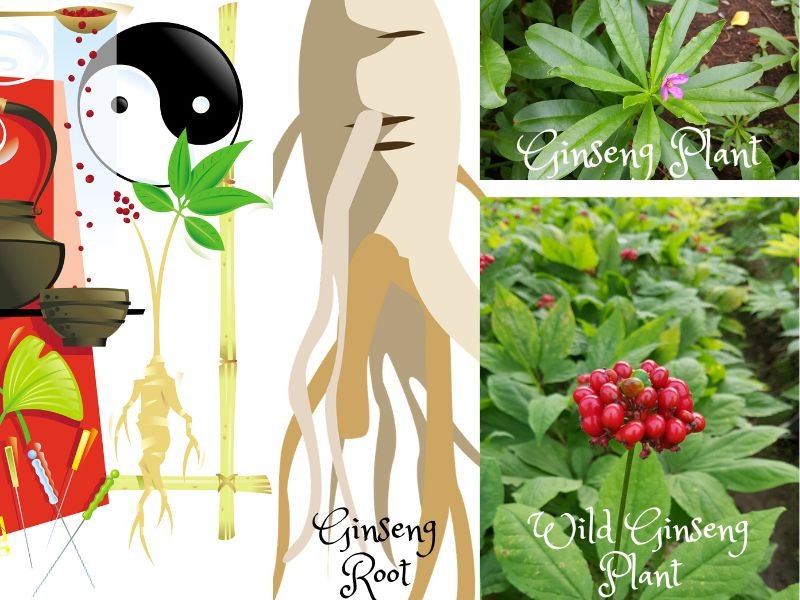What is Ginseng?
Ginseng is a perennial herb known for its strong roots. Ginseng is a plant genus with species native to both Asia and the Americas.
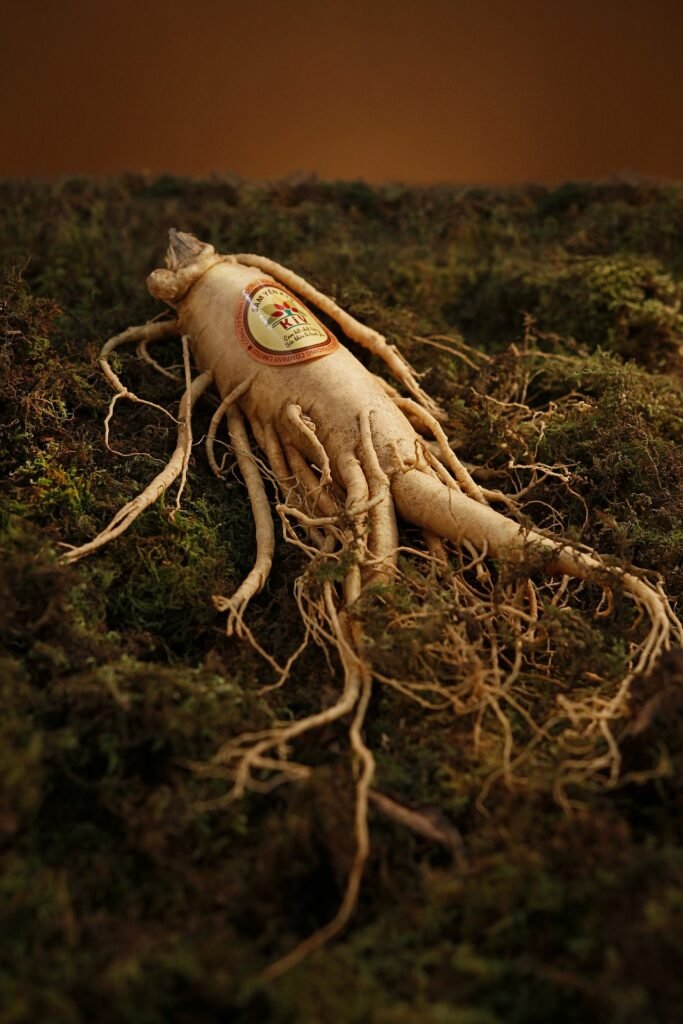
Ginseng trees are low-growing plant such as strawberries and other herbs. Each plant normally grows from three to five leaves that could be entire, toothed, or lobed. The leaf shape depends wholly on the ginseng species. The leaves of ginseng die in the fall and regrow in the spring. They have an interesting long fleshy root, which is considered to resemble a human body.
Ginseng’s root’s appearance gave it its name, which is derived from Chinese terms meaning “likeness of man.” Though they are most popularly appreciated for medical usage in Korea, Chinese herbal medicine traditions also utilize ginseng to treat a number of diseases.
The Chinese were the first recorded people to utilize ginseng on a daily basis. The name they gave it was a combination of the Chinese terms for “man” and “plant,” because the plant’s root usually grows to resemble a human figure.
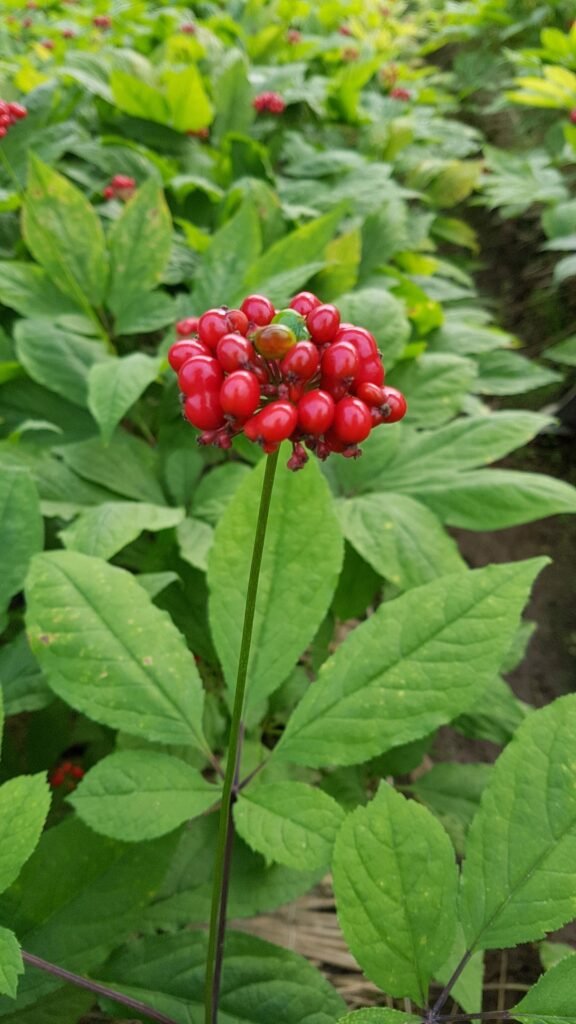
The plant later became known as Panax, a Greek word meaning “all healing,” or “treat all,” and it is connected to the word panacea. In traditional Chinese medicine, ginseng was utilized as a “warming” herb since it was believed to boost energy and increase and stimulate biological functions. It was commonly used to boost sexual desire and potency.
Types of Ginseng
There are two primary forms of ginseng: (i) Oriental ginseng (Panax ginseng), and (ii) American ginseng or wild ginseng (Panax quinquefolius) .
Oriental ginseng is grown in China and Korea and mainly consists of Red and White Ginseng. White Ginseng comes from the naturally dried root of the Oriental ginseng farmed in Korea. Red ginseng is the most expensive variety, and that is the one utilized most by athletes for enhancing their endurance.
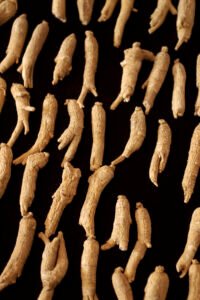
Red ginseng, the most popular variety of ginseng in the East, is created by boiling the Korean White Ginseng root for 8 to 10 hours, then letting it dry. The resulting ginseng is red and is often believed to be of more power than that of White Ginseng.
American ginseng has similar qualities like oriental ginseng but is a little bit more affordable. American ginseng is native to Eastern North America. Its distribution stretches from Southern Ontario to Georgia and as far west as Wisconsin.
Most Oriental and American ginseng that is used has been grown since wild ginseng is very rare. High quality white ginseng is often farmed in the US. It can take up to six years before the root is considered mature enough to harvest, and older roots are considered substantially more potent and lucrative.
The slow growth rate and strong demand make ginseng a valuable commodity, frequently offered in powdered form to make modest doses easy to handle. Another approach to consume ginseng is to brew the dried root directly in hot water to form a herbal tisane.
Siberian ginseng
For ages, Eastern nations as well as China and Russia have used Siberian ginseng (Eleutherococcus senticosus), which is also commonly known as eleuthero. Despite having the same name, it is entirely different from Asian (Panax ginseng) and American (Panax quinquefolius) ginseng and contains separate chemically active ingredients. Eleutherosides, the active components of Siberian ginseng, may boost the immune system.
Healing Elements Of Ginseng Tea
Ginseng has two major compounds: ginsenosides and gintonin. Panaxosides, commonly known as ginsenosides, are the most potent and therapeutically effective components found in ginseng roots. They are the most sought-after natural saponins in nature that can permeate cells to boost resistance to stress and enhance cellular balance.
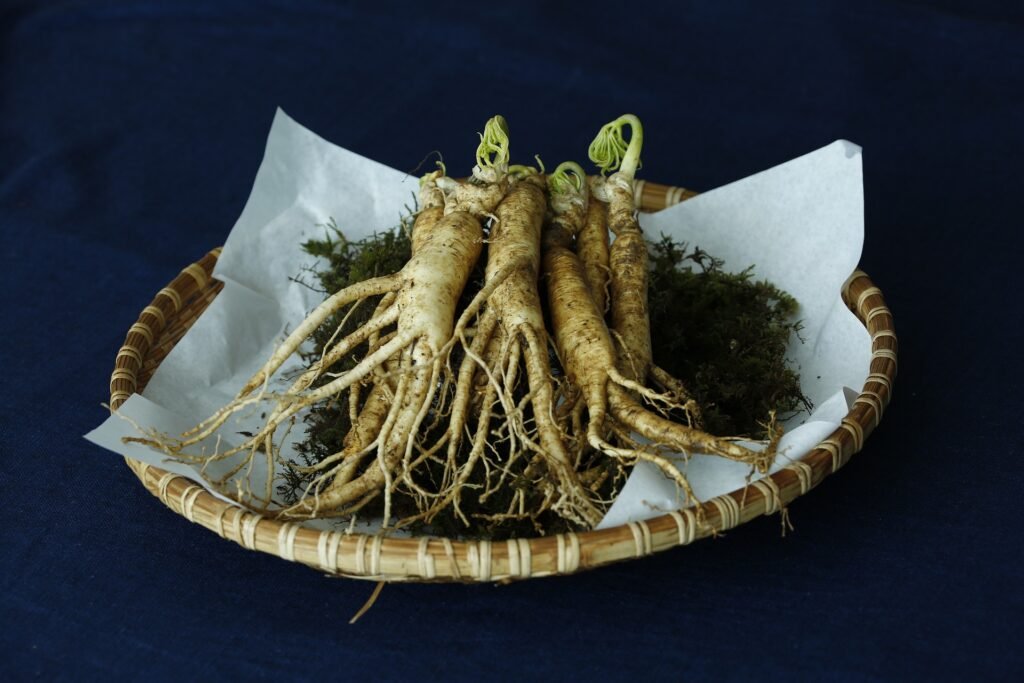
Gintonin is a compound of glycosylated ginseng proteins including lysophosphatidic acids (LPAs) that constitute the intracellular lipid mitogenic mediator. The G protein-coupled receptors (GPCRs) for LPA are selectively and powerfully activated by gononin. As a result, LPA and its GPCRs are now also connected to the effects of ginseng.
American ginseng is preferable for warmer months because it is known for being more cooling and less stimulating, as well as for strengthening immunity. Oriental ginseng is excellent in the cooler months because it is very warming, stimulating, and energy boosting. American ginseng is thought to have a calming impact, whereas Asian ginseng is thought to have an energizing effect.
What Is Ginseng Tea?

Ginseng tea comes from the root of the ginseng plant instead of being produced from the plant’s leaves. Ginseng tea can be brewed using the roots, powdered roots or cuttings from any part of the plant. To create the tea, the ginseng is cooked in water. The traditional tea procedure comprises boiling the plants in the water on low heat for a few hours. Through this method, the water absorbs the plant’s essence.
What Does Ginseng Tea Taste Like?
Ginseng tea might taste sweet at first yet has a bitter aftertaste. Some people believe that it has a relaxing effect. While ginseng tea may be energizing, it may not be everyone’s cup of tea. It has quite an unique, bitter taste with earthy, warming overtones. Many people add honey, lemon or ginger to add a bit of sweetness or flavor.
How to Make Ginseng Tea
To gain all of ginseng tea’s benefits , you can use either fresh ginseng root or dried ginseng. Due of its strong taste, brewing tea is a particularly common method of acquiring ginseng’s advantages. Here are some basic tips to help you create the perfect ginseng tea.
- Use a peeler or a sharp knife to slice a fresh ginseng root or a dried ginseng root.
- Bring a pot of water to a boil and turn off the heat.
- Add one teaspoon of ginseng per cup of water or one tablespoon fresh ginseng leaves . You can change the amounts to fit your preferences.
- Allow it to steep for 5 – 10 minutes, covered.
- Pour the tea into mugs after straining. Add honey or sweetener as desired.
Health Benefits of Ginseng Tea
Ginseng tea offers a whole range of benefits for your body. Here are 5 of its main health benefits:
Improves energy levels
Studies on ginseng have showed that it may in fact assist enhance your energy and battle fatigue. One study looked at the impact of providing 1 gram, two grams or a placebo to 90 persons during the course of a month. Results found that the group given ginseng experienced less mental and physical fatigue to those taking the placebo.2
Improves brain function
Studies have indicated that ginseng could assist boost numerous distinct brain processes relating to memory, conduct and mood. Regular ginseng use can enhance your cognitive capacities, making it easier for you to retain information and increase attention and concentration.
Intriguingly, ginseng has benefits that extend beyond ensuring regular brain health and may help with the prevention and treatment of diseases like Alzheimer’s and dementia. Ginseng also lessens menstrual discomfort.
One particular study studied 30 healthy participants who got 200 mg of ginseng daily for four weeks. By the end of the trial, research found that there was an improvement in mental health, social functioning and mood.
However, by the end of the research it was deemed that the effects of ginseng declined after eight weeks and hence extended use is not thought to be beneficial.5
Boost immunity
Research reveals that the antioxidants included in ginseng are helpful at boosting immunity which helps ward off infections and enables every component of your body to live healthier. As a result, ginseng is also often used to relieve pain, swelling redness and soreness.
Ginseng is known to enhance your immune system by enhancing white blood cell activity in your body. One research study suggest that a daily intake of ginseng could help fight off the common cold and other viruses by remaining on top of your body’s immunity.
Improves heart health
Some studies suggest that ginseng helps lower blood pressure, protect against heart failure and assist maintain good cholesterol by boosting circulation and supporting the control of blood lipids (fats) (fats). A 2012 assessment of studies came to the conclusion that “the sum of the evidence clearly shows that ginseng protects against myocardial injury.”
Improves Physical Performance
Ginseng may not only improve mental performance, but it may also have a major positive impact on physical performance. According to studies, it may improve aerobic endurance and lessen chronic weariness.
Uses of Ginseng Tea
Ginseng tea is taken orally and sipped as a hot beverage. Always follow the recommendation on the label since dosage will depend on the type of ginseng. If you have any concerns you should always inform your GP or pharmacist before ingestion.
Does Ginseng Tea Have Caffeine?
An herbal tea with no caffeine is ginseng tea. Even though ginseng tea lacks caffeine, it may aid in reducing fatigue. Studies indicated that ginseng may assist increase both mental and physical performance, which makes it an excellent substitute for regular caffeinated drinks.
Is Ginseng Tea Safe for Everyone?
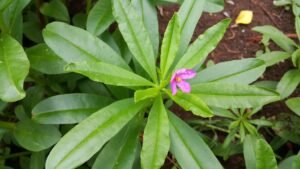
Usually ginseng is considered safe for everyone. However, it’s crucial that you stick to dosage restrictions to avoid later issues. NOTE: If you are on anticoagulant drugs like coumadin, you want to avoid ginseng and also, if you have hypertension, you want to avoid ginseng.
Ginseng Tea Dosage
The disease you intend to treat will determine how much medication you should take. Overall, daily doses of one to two grams of raw ginseng root or 200 to 400 mg of extract are indicated. It’s better to start with lesser doses and grow over time.
Look for a normal ginseng extract that contains two to three percent: total ginsenosides and drink it before meals, to maximize absorption and gain the full benefit. Safety and potential negative effects according to study, ginseng looks to be safe and should not generate any major unwanted effects.
When using ginseng, however, individuals on diabetes drugs should closely monitor their blood sugar levels to make sure they do not go too low. In addition, ginseng may lessen the impact of anticoagulant medications.
For these reasons, consult your doctor before taking ginseng supplements, and be aware that ginseng is not suggested for children or women who are expecting or nursing because there aren’t enough safety studies on it. Lastly, there is data suggesting that the extended usage of ginseng could diminish its effectiveness in the body to maximize its effects.
Side Effects of Ginseng Tea
The most prevalent side effects of taking ginseng tea, include:
• Insomnia
• Headaches
• Being irritated
• Upset stomach
• Change to blood pressure
If any of these side effects persist or worse, then you should contact your GP or a health expert for more advice.
Where can I buy ginseng tea?
Ginseng tea is widely available and can be found in most shops and supermarkets.
…………………………………………………………………………………………………………………………………………..

